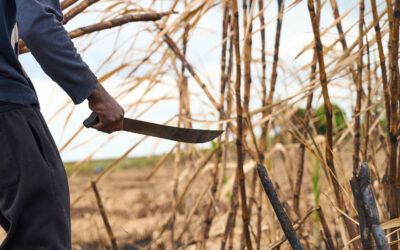From an early age I felt the vocation to do everything in my power to fight injustice, and I have been working for more than 20 years to advance human rights and gender equality in different countries. Injustice is manifested in different ways with different peculiarities and nuances. But in essence it is always the same: the absence of rights and fear of what is different.
This is what brings me to the villages of the Dominican Republic. Human trafficking is a despicable crime, a violation of fundamental rights. But here, many individuals don’t think of themselves as trafficking victims, and they aren’t sure what to do about it. I am working to change that.
There is a generalized idea that trafficking depends on organized crime and sophisticated mafias, and that it occurs in hidden and distant places. However, the truth is that on many occasions, trafficking does not require such complexity or sophistication, it can occur in the same family or community context, sometimes the perpetrators are neighbors or even family members. On other occasions, trafficking occurs in broad daylight, before the eyes of the whole world and, despite everything, it remains unseen.
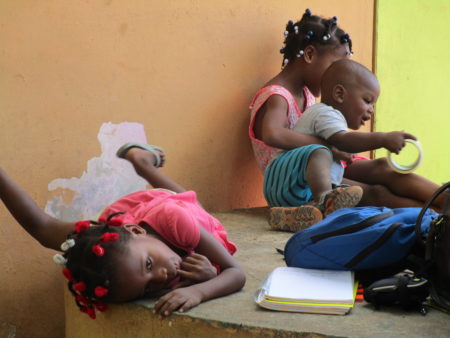
An uncomfortable truth is that many places trafficking is naturalized socially, which prevents victims from identifying themselves and makes it difficult to denounce and prosecute their traffickers.
Sometimes societal justifications are expressed for commercial sexual exploitation. For example, sometimes people say, “She could do something else, but she wants easy money,” without thinking if the girl is a minor or considering the circumstances that led her to that situation.
Discrimination against certain groups is also a problem. For example, sometimes people in the Dominican Republic say, “Haitians come to invade us.” This can legitimize exploitation.
For this reason, rights education is extremely important. It is the key that allows social transformation.
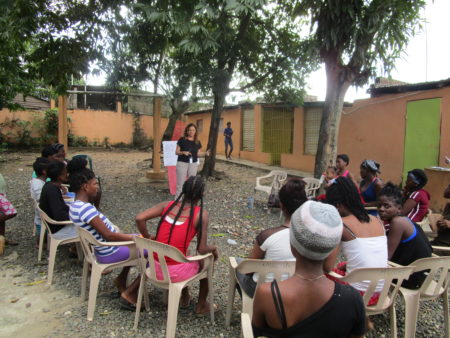
In the D.R., Free the Slaves and our local partner MUDHA have started our work in highly vulnerable communities that live in precarious conditions that make residents especially susceptible to being victims of trafficking. Our first visits to the communities have focused on talking about human trafficking and explaining its meaning. At first, nobody knew what those words meant, but as we were giving examples, many felt that those words had been part of their lives without knowing it until now.
It is the case of Manuel, who after the village talk raised his hand to speak.
“I did not know this word before, but now I realize that I was treated as a child. I am an orphan of father and mother since I was very young, that’s why a family welcomed me, but it made me work very hard from a very young age. Until now, I didn’t realize that I was exploited,” he said.
Our village talks are allowing people to become aware that their exploitation is illegal. But just as important, the talks allow people to be heard for the first time, to know that someone is interested in their personal stories.
This is one of the things that has moved me most, the importance of being heard. In another of the communities I had the opportunity to interview one of the elders of Haitian origin. He had been in the country for more than 60 years, explaining to me that he had arrived as a young man deceived and forced to cut sugar cane for most all his life.
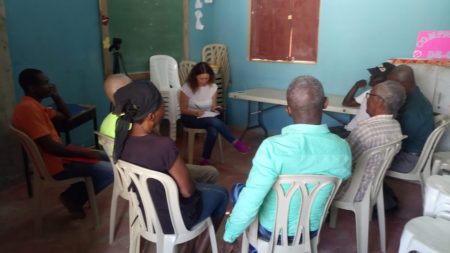
“In those times they did not let us work on anything else. They paid very little and we went hungry. My wife got sick and we did not have medicine, so I tried to leave the batey (cane cutter community) to look for another job in the capital and buy medicines. I went out at night so that the guards would not see me, but they caught me, threw me to the ground, they pointed their rifles at me and all the soldiers kicked me, they told me not to get out of there again. I was wounded for several days without being able to move or work, then my wife died without I could do anything to help her,” he said.
In another village, leaders told me about the history and situation of their community. They are worried about the conditions in which many girls and teenagers are living.
“There is a minor who has been on the streets for several days because she says that her stepfather abused her many times. She told her mother, but she does not believe her and threw her out of the house. So she is in the street. Days ago, I do not see her, maybe she’s in a 3 x 100,” the person told me. I asked what that means. It means that teen trafficking is so common that there are street slang terms for various situations. In this case, it’s 3 minors for 100 pesos ($2 USD).
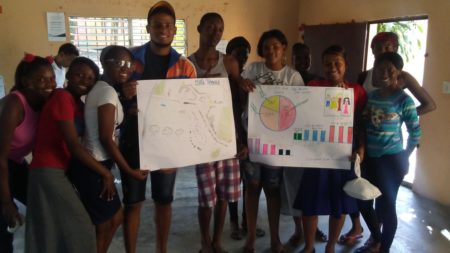
Social mapping is an important step in community education and mobilization to confront modern slavery | Photo: FTS/Bardaji
Our first contact with communities is having a very important impact. Almost immediately, people can identify cases that they previously did not regard as crimes. Now, they feel motivated to change the situation. It is a fundamental component of the Free the Slaves Community Liberation Model.
The strength of sharing stories out loud has had an incredible effect, it is as if the words register in the environment and remain so that no one will forget them. Rights education and giving voice is the crucial first step to activate organized collective action capable of contributing to the fight against human trafficking.
This is our first step.
Gemma Bardaji is the Free the Slaves Dominican Republic Country Director. Learn more about our program, conducted in partnership with MUDHA and the IAWJ, here.

